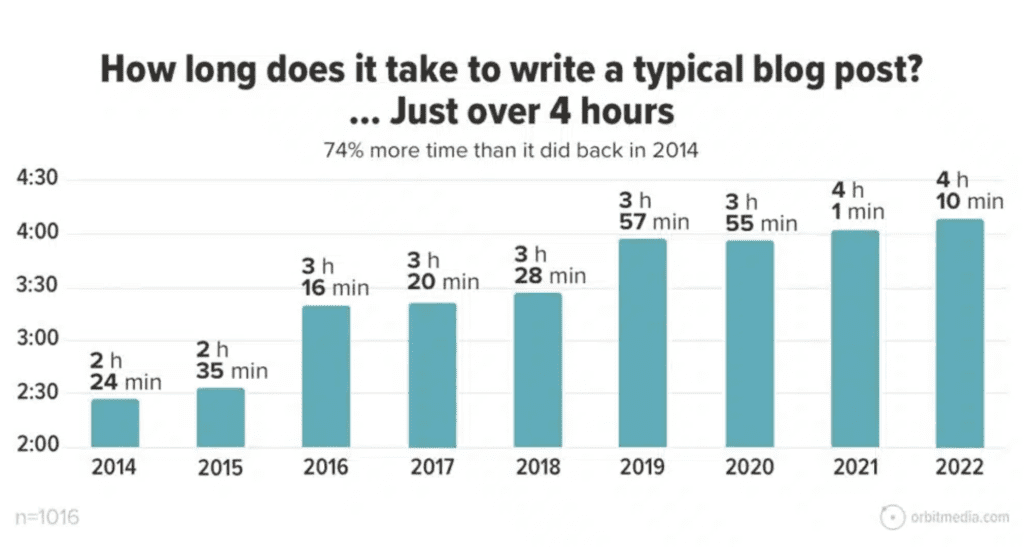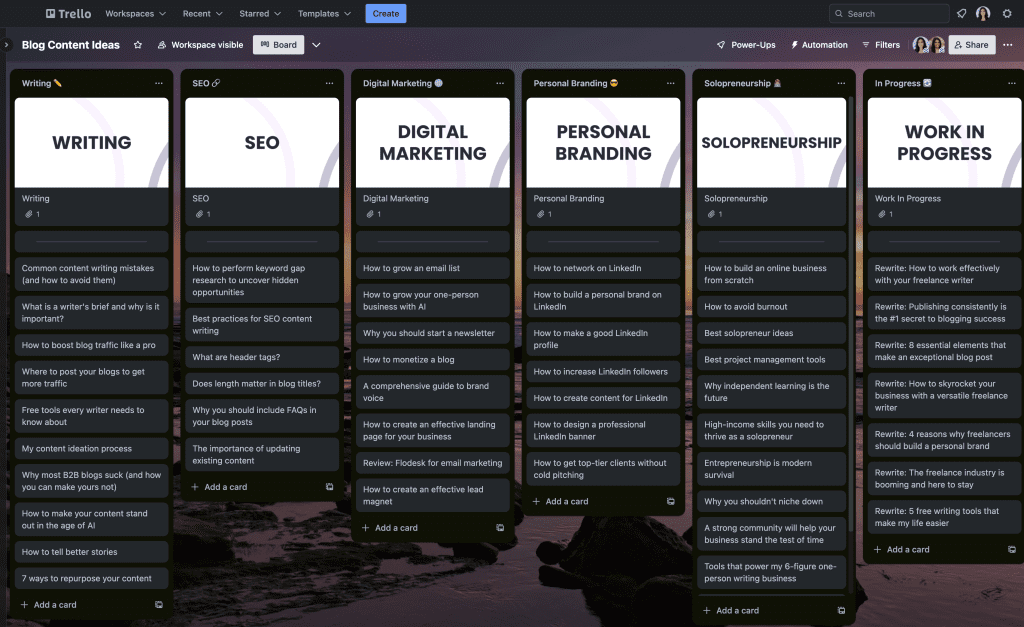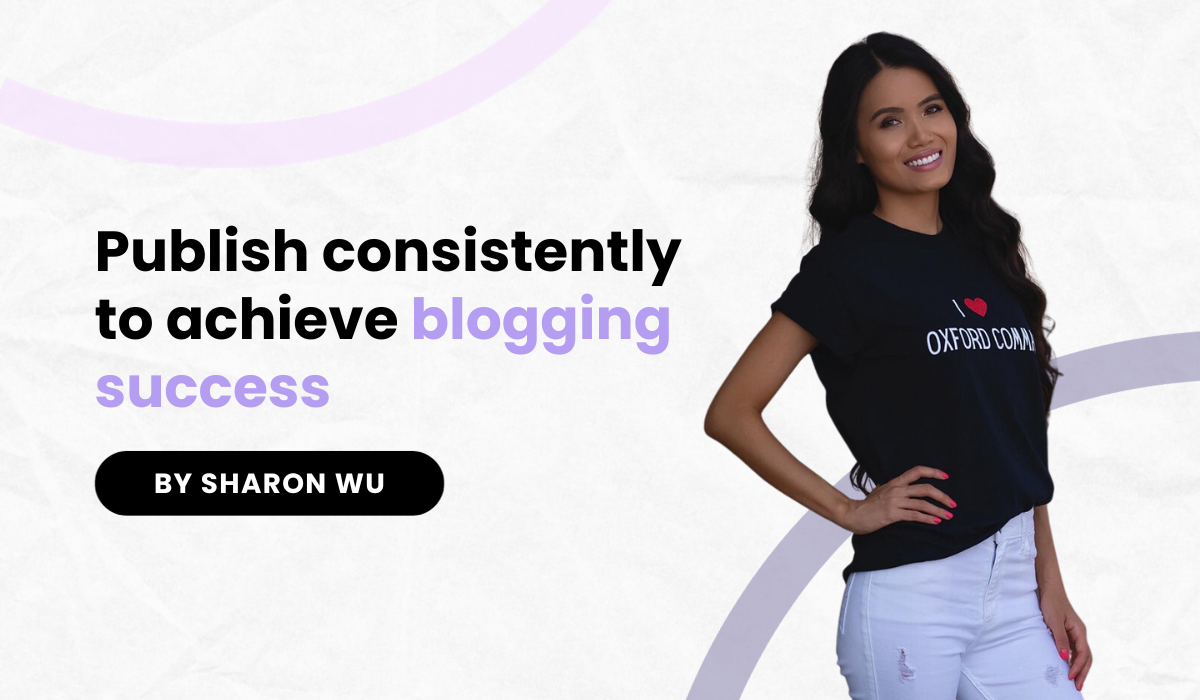Having a blog on your website is a smart and cost-effective way to share your expertise with your ICP. But you won’t attract an audience if you post once or twice and then disappear for months at a time.
The truth?
Consistent blogging while delivering meaningful value is time-consuming.
According to a survey on Orbit Media, it takes about 4 hours to write a single blog post! This doesn’t account for SEO optimization, formatting, adding multimedia, or other content creation aspects. It’s no wonder business owners juggling a million other important tasks get overwhelmed at the thought of blogging.
Fortunately, there are steps you can take to make the process easier. Discover how creating a content calendar and outsourcing to a freelance content writer gives you more time to focus on business growth.

Why consistent blogging matters for SEO
One of the biggest reasons to maintain a steady blogging schedule is improved search engine optimization (SEO).
Fresh content boosts your chances of earning backlinks from authoritative sites. The more quality backlinks pointing to your blog, the higher it’ll rank for target keywords.
Google also favors websites that consistently offer useful, relevant information to searchers. Regularly updating your blog shows search engines that you’re a trusted authority in your niche.
Besides making Google happy, consistent blogging benefits your audience. New and engaging content keeps people coming back for more.
Say you visit a website and see that there hasn’t been an update in months. The likelihood of you revisiting is slim to none.
But what if you are on a site with new content published weekly? You would find this source relevant and credible, and be more inclined to buy from them.
Improve rankings with more helpful content
Think of blogging as a long-term content marketing strategy. The more content you publish, the more opportunities there are for that content to be found and shared.
Having a deep well of blog posts gives Google more pages of your site to crawl and index. A higher volume of insightful content also helps you rank for a greater variety of keywords.
For example, a health blog with only 10 blog posts may only rank for broader terms like “healthy recipes.”
But a health blog with 100+ in-depth articles can also rank for longer, more specific queries like “Mediterranean diet meal plan” or “benefits of turmeric for arthritis.”
The more content you have, the higher the chances searchers will find your site for queries related to your niche.
Just remember — volume alone isn’t enough. In this AI-driven era, the Internet is littered with thin, mediocre content.
The best way to stand out?
Put yourself in your audience’s shoes and think before you write:
What kind of questions would people likely be asking on this topic?
How can you answer these questions to help them?
Keep readers coming back
Now you understand why blogging consistently matters for SEO. But what about your actual human audience?
Truth is, blogging consistently keeps visitors engaged and coming back to your site for more value.
Imagine you visit a website and see the blog hasn’t been updated for 6 months. You likely won’t revisit it anytime soon, since the content is clearly outdated.
But what if a site publishes multiple new, useful articles every single week? As a reader, you’d find this source highly relevant and be eager to consume their latest content.
Prove your authority
By publishing thought-leadership posts frequently, you establish authority and credibility with readers.
You demonstrate that you’re actively involved in your industry and have your finger on the pulse. Readers see you as the go-to expert for solutions to their pain points and questions.
Not only does this build trust, but it keeps visitors returning to gain your latest insights. Every new article presents an opportunity to strengthen your relationship with readers.
Build a loyal audience
Your blog allows you to have an ongoing dialogue with your audience. The more you engage them with content tailored to their needs, the more loyal they become.
Launching one viral blog post may attract a temporary influx of readers. But only regular value and engagement convert readers into loyal brand advocates.
These loyal followers are most likely to convert into customers and rave about your business to others. They become part of your community for the long haul.

How to create a content calendar
A content calendar includes blog topics and tentative publishing dates to help you stay on track.
Having a concrete plan in place ensures that you have content ready to go at a moment’s notice. This makes it a breeze to stick to a schedule without worrying about missing deadlines or having content gaps.
You may wonder, “How do I create a content calendar?”
1. Choose main topics
First, identify the top-level topics for your blog.
For example, if you are a health & wellness company, you may break down your topics like this:
- Workout tips
- Healthy recipes
- Mental well-being
- Sleep and recovery
Once you select your main topics, it becomes easier to brainstorm specific post ideas.
Not sure what to write about?
Do a quick Google search and see what your competitors are writing about. The top results reveal what people often look for and click on. Pull inspiration from that and aim to produce content on those topics that pack even more value.
Pro tip: Trello is a fantastic place to brainstorm and keep track of topic ideas for your blog.

2. Add working titles and dates
Under each topic, list working titles for posts you plan to write. Include tentative publishing dates so you know when each one needs to go live.
Here’s what that may look like:
Healthy Recipes
- “5 Plant-Based Protein Sources” – Publish December 1
- “8 Fun Ways to Eat More Veggies Every Day” – Publish December 15
Workout Tips
- “Easy Upper Body Workout for Beginners” – Publish December 8
- “How to Choose the Right Socks for Pilates” – Publish December 22
Your calendar allows you to map out content weeks or months in advance. You’ll always know what posts to work on and when.
3. Create quality content
Once you have your content calendar set, it’s time to breathe life into your ideas by creating engaging content.
When writing your posts, focus on providing maximum value to readers through:
- Actionable advice and writing tips: Include specific steps and recommendations your audience can follow. Don’t just educate — provide a clear path to solve problems. Show, not tell.
- Unique perspectives: Offer fresh angles on popular topics that stand out from competitor content. Share your unique viewpoint as an industry leader.
- Thorough research: Back up your advice with data, expert insights, case studies, and credible sources. Demonstrate you truly understand the subject matter.
- Storytelling: Relatable stories and examples grab the reader’s attention better than dry facts alone. Paint the picture for your audience.
- Conversational tone: Write like you speak to build a personal connection with readers. Avoid overly formal, stiff, or complex language.
In terms of frequency, publish 3-4 blog posts per month when starting out. You can increase volume as you build momentum. But always focus on superior quality over quantity — your audience wants content worth reading and sharing.
4. Promote and repurpose content
Get the most mileage out of each piece of content you create.
After publishing a post, promote it on social media and email lists to extend reach.
Also, consider repurposing each blog into:
- A podcast episode
- An engaging LinkedIn carousel
- A short TikTok video or Instagram reel
- An insightful infographic to share on Twitter
Re-promoting evergreen content keeps it circulating for greater impact over time.

Why you should outsource blog content writing
Let’s be real — producing quality content regularly requires heaps of time and effort.
If you’re an entrepreneur with many competing priorities, creating great content can be challenging.
Outsourcing to an experienced writer is an effective solution, and here’s why:
Access top-notch writing skills
Blog writing requires skills that take years to develop.
Freelance writers know how to:
- Capture your brand’s voice
- Include SEO keywords naturally
- Research and outline posts efficiently
- Structure content in a readable format
- Craft compelling headlines and introductions
- Deliver polished copy that needs minimal edits
- Turn detailed writer’s briefs into compelling content
They also work significantly faster than someone who doesn’t specialize in content creation. This saves you countless hours that can be directed into other revenue-generating tasks.
Free up your schedule
Consistent blogging is essential. But you may struggle to find time for writing between managing your business operations and serving customers.
Delegating to a content writer adds more available hours back into your week. This alleviates the pressure of creating blog posts, so you can focus on where you add the most value.
Outsourcing gives you time and mental space back. You reap the benefits of blogging without sacrificing your sanity.
Enhance blog quality
Hiring a pro writer elevates your content quality. Rather than squeezing in posts between your other work, you can publish in-depth content that aligns with your brand’s voice and goals.
A dedicated writer also brings objectivity you may lack if writing about your own company and offerings. They help identify topics and angles you may otherwise overlook.
The result?
Your blog content will capture attention rather than blend into the cluttered landscape. It’ll convert readers into leads because it solves their pain points.

Blog consistently to grow your business
Maintaining a consistent blogging schedule takes commitment.
But it generates immense value for your business when done right:
- Position yourself as an authority readers can rely on
- Build lasting relationships with an engaged audience
- Attract more organic search traffic by improving SEO
- Encourage backlinks from other websites with authority
- Establish credibility and thought leadership in your niche
- Boost brand awareness and visibility for your products/services
So, get bloggin’ if you are serious about growing your business!
Rather trust a skilled content writer in developing your blog?
With almost a decade of writing experience under my belt, I produce articles that your audience will love reading and sharing.
I’m a versatile writer who helps B2B & B2C brands and founders communicate their expertise, build awareness around their offers, and attract sales-ready leads.
When you hire me, you’ll get a specialized researcher, writer, and editor — so you can publish posts consistently without burning out.
Contact me to learn how we can work together on an effective blogging strategy!
Frequently asked questions (FAQs)
How often should I blog to see results?
Aim to publish at least 4 blog posts per month, or 1 post weekly. At a minimum, blogging 1-2 times monthly can help you steadily grow your audience and SEO. Increase frequency from there once you build momentum.
How long should my blog posts be?
The length of your blog posts depends on the topic. Ideally, aim for at least 1,500-2,000 words per post. In-depth articles over 1,000 words tend to perform best for SEO and engagement. A good practice is to check what top-ranking articles are doing, use them as a “springboard,” and provide more value.
What makes a good blog post title?
Effective titles identify the post’s main benefit and include keywords your audience searches for. They evoke curiosity with questions, numbers, and compelling phrasing. Make them descriptive, yet concise.
What topics should I blog about?
Choose topics strategically aligned with your ideal reader’s interests, pain points, and questions. Identify keywords and search intent to understand what information your audience is seeking. Also, consider trends and current events to tap into what’s relevant.
How do I write blog posts quickly?
Producing top-notch blog content requires substantial time and writing expertise. To maintain consistency without sacrificing your schedule, outsource to a professional freelance writer. This ensures you publish engaging valuable content regularly — while you tend to other critical business tasks.
Why should I hire a freelance writer to write my blogs?
Freelance writers specialize in content creation full-time. Their skills and efficiencies from experience allow them to research, produce, and deliver high-quality posts faster than you can solo. This saves time while leveraging writing experts dedicated to creating content that truly engages your audience.
This article was originally published on LinkedIn, but was updated on 10/22/2023.


